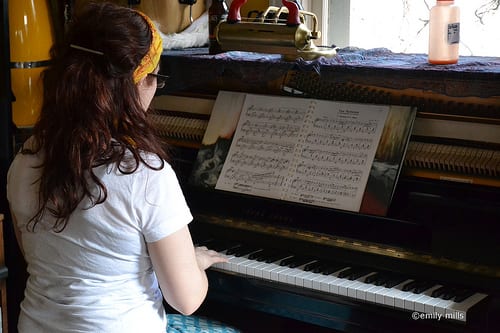 Last-minute trip to the grocery store? Check. Turkey thawing in the fridge? Check! Tomorrow is Thanksgiving, and if you’re like most families, you’ve got a thousand things on your “To Do” list from now until the New Year! So how can you or your child stay committed to practicing? The following tips come from Mary W., one of our newest piano teachers in North Hollywood, but they can be easily applied to any instrument…
Last-minute trip to the grocery store? Check. Turkey thawing in the fridge? Check! Tomorrow is Thanksgiving, and if you’re like most families, you’ve got a thousand things on your “To Do” list from now until the New Year! So how can you or your child stay committed to practicing? The following tips come from Mary W., one of our newest piano teachers in North Hollywood, but they can be easily applied to any instrument…
Practicing. Easy in concept, hard in realization! Almost every single parent with a child in music lessons deals with the screams, arguments and outright tantrums that children throw to get out of practicing. It happens to everybody. I’ve put together some helpful tips and ‘mantras’ so to speak, to help parents brave this struggle:
1) Patience!
I know, easier said than done. When your child is on the floor for the fourth straight night in a row after only three weeks of lessons, you are ready to quit. Don’t! They are doing exactly what we as adults really want to do when we are asked to do something in which we see little merit. However, as adults we eventually learn that the outcome is worth the effort. Which leads to my next idea…
2) Practice is a LEARNED behavior, not a natural one.
This is the gospel in my studio! It is such a simple idea, but so hard to remember when things are getting hard. Even as adults, practicing can be a hard routine to settle into. I can’t tell you how many of my adult students come to piano lessons for one reason: they want someone to hold them accountable. They are aware of themselves enough to know that they will not practice and progress on their own. They need someone to not only guide them through learning, but also give them a hard time when they aren’t practicing enough.
Children, on the other hand, have no clue what practice does. They have not had the experience to know, “Hey, if I do this enough I will get better!” We, as teachers and parents, help them learn this. Even after they put in the practice, and pull together a piece they never thought they could do, in the end they believe it just happened! They sometimes don’t remember the work, effort, sweat and tears (for parents) that went into that piece of music. Keeping this idea in mind will help calm your resolve for helping them practice.
3) Personal Responsibility.
I am a HUGE believer in personal responsibility at any age when it comes to music lessons. However, this doesn’t mean to expect your kid to know when and how to practice everyday. It means giving them the tools and support to accomplish music themselves and own up to the idea that no one else can do it for them. One way I accomplish this with all of my students is through the use of a weekly calendar.
We are all familiar with the list of things to practice. “Page 13-14 in the method book, exercises blah blah blah…” Instead, I break the weeks practice down by day, and for each day exactly what the student will work on for 15-30 minutes. For example, on Monday the student will practice measures 1-4 on page 13 for 15 minutes. On Tuesday, measures 5-9 for the same period of time, and so on. Bam! No questions asked, no fights over not knowing what to practice – it is there in black and white. All the student has to do is do the exercises.
For the parents, this takes them out of the ‘bad guy’ role. No longer are they the ones telling them what they should be doing, I (‘Miss Mary’ aka the teacher) am. If the student doesn’t do what is asked, the consequence and discussion will happen with ‘Miss Mary’ as well. Again, this encourages a positive relationship between parents, children and teacher. Most importantly, it allows the student, young or old, to take personal responsibility for their actions in a very easy way.
4) Reward Systems
Reward systems can be a great way to promote practicing as a positive experience, instead of an isolated one. This is really dependent on home dynamics, and what parents already use as incentives. For examples, if your young student practices his/her allotted time, let them choose what the family will have for dinner!
5) Home Recitals
I actually was given this idea by a young student, and it worked really well for her and her family. She decided that she was going to give a mini-recital of everything she had worked on that week for her parents and her sister. This became a family event every week and encouraged her to practice. Above all, her family really enjoyed it and this gave them all a reason to become involved in her music development.
In the end, every student is different and what works for some will not work for others. The beauty of private piano lessons is the personal relationship between teacher, student and parents, which can really pinpoint attitudes and behaviors that will work best for all involved.
You might also like…
– Helping Your Child Set Music Goals
– The Real Secret to Effective Practicing
– Videos We Love: How NOT to Practice
 Mary W. teaches piano, singing, clarinet, music performance, music recording, music theory, opera voice, songwriting and bassoon lessons to students in North Hollywood, CA. Her specialties include classical, contemporary, pop, jazz and improvisational styles. Learn more about Mary, or search for a teacher near you!
Mary W. teaches piano, singing, clarinet, music performance, music recording, music theory, opera voice, songwriting and bassoon lessons to students in North Hollywood, CA. Her specialties include classical, contemporary, pop, jazz and improvisational styles. Learn more about Mary, or search for a teacher near you!
Photo by Lost Albatross
Suzy S.
